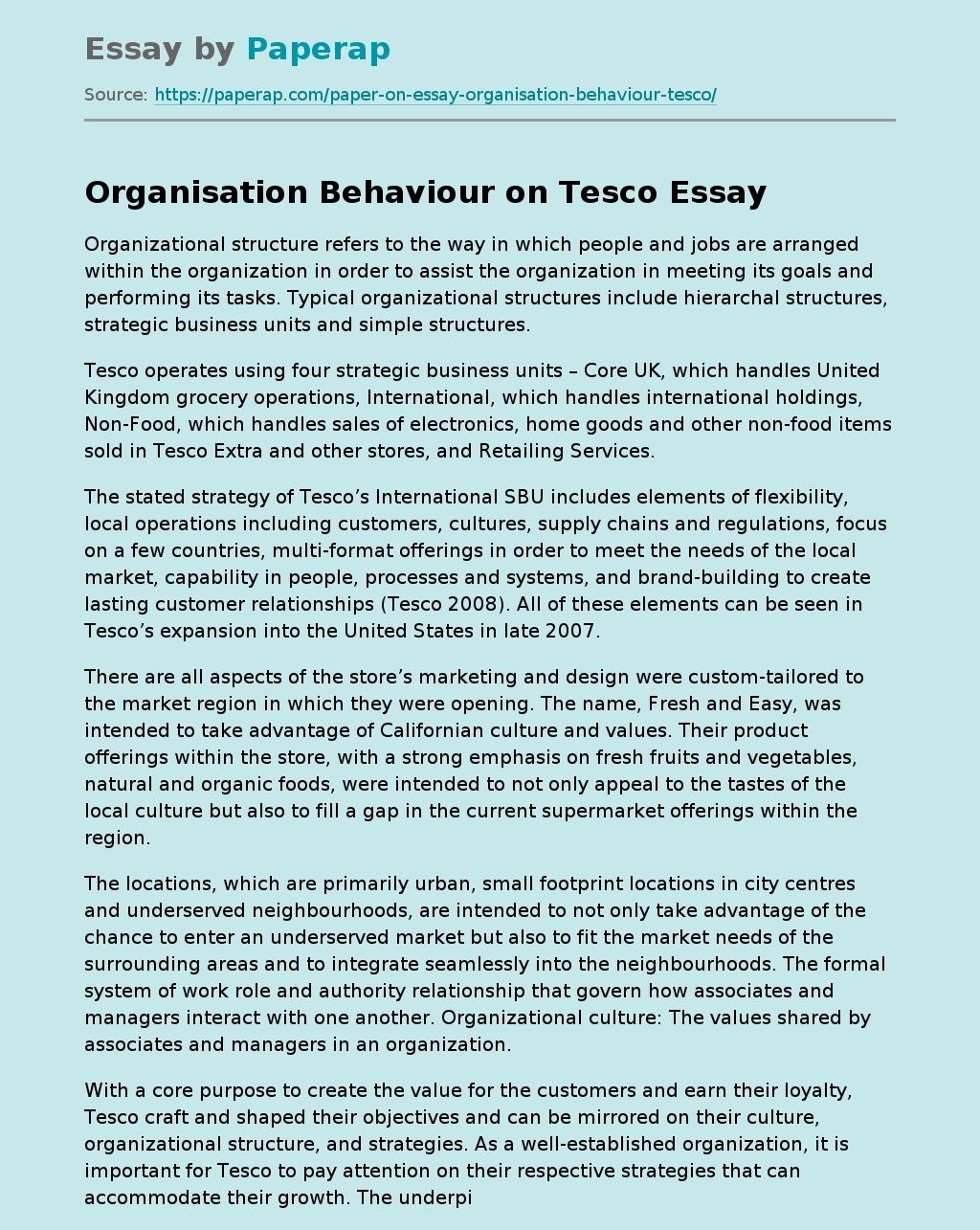Organisation Behaviour on Tesco: Structure
Organizational structure refers to the way in which people and jobs are arranged within the organization in order to assist the organization in meeting its goals and performing its tasks. Typical organizational structures include hierarchal structures, strategic business units and simple structures.
Tesco operates using four strategic business units – Core UK, which handles United Kingdom grocery operations, International, which handles international holdings, Non-Food, which handles sales of electronics, home goods and other non-food items sold in Tesco Extra and other stores, and Retailing Services.
The stated strategy of Tesco’s International SBU includes elements of flexibility, local operations including customers, cultures, supply chains and regulations, focus on a few countries, multi-format offerings in order to meet the needs of the local market, capability in people, processes and systems, and brand-building to create lasting customer relationships (Tesco 2008). All of these elements can be seen in Tesco’s expansion into the United States in late 2007.
There are all aspects of the store’s marketing and design were custom-tailored to the market region in which they were opening.
The name, Fresh and Easy, was intended to take advantage of Californian culture and values. Their product offerings within the store, with a strong emphasis on fresh fruits and vegetables, natural and organic foods, were intended to not only appeal to the tastes of the local culture but also to fill a gap in the current supermarket offerings within the region.
The locations, which are primarily urban, small footprint locations in city centres and underserved neighbourhoods, are intended to not only take advantage of the chance to enter an underserved market but also to fit the market needs of the surrounding areas and to integrate seamlessly into the neighbourhoods.
The formal system of work role and authority relationship that govern how associates and managers interact with one another. Organizational culture: The values shared by associates and managers in an organization.
With a core purpose to create the value for the customers and earn their loyalty, Tesco craft and shaped their objectives and can be mirrored on their culture, organizational structure, and strategies. As a well-established organization, it is important for Tesco to pay attention on their respective strategies that can accommodate their growth. The underpinning principle of this strategy is to broaden the scope of the organization to enable the business in a sustainable long-term growth and gaining more advantages.
The idea of expansion became popular among the business entrepreneurs because it allows the business to grow according to the flow of environment in the foreign land. However, the idea of Tesco in utilizing its advantages in expansion does not stop in one expansion or two. They followed the expansion strategies with another that makes the organization expand more and reach the markets effectively by offering the products and services the country truly needs.
In addition, the diversification on the products and services of the organization is identified as another success of the organization in their business. The continuous development of the organization in reaching the unsaturated markets is strength of the organization towards the competitiveness and profitability. Practices and strategic management of the organization reflected in the five elements in which the retailers and other organizations around the world are attempting to gain:
- To be a successful international retailer.
- To grow the core UK business.
- To be as strong in non-food as in food.
- To develop retailing services – such as Tesco Personal Finance, Telecoms and Tesco. com
- To put community at the heart of what TESCO
Identifies the relationship between organization structure and culture and how the business performance could be increased. Organisations must have some sort of formal structure in order for work to be carried out efficiently. An organisation comprise of people there is also an informal organisation with different interlocking relationship, which gives rise to different behaviour, attitudes, individual perceptions and levels of ability and aptitude. The above mentioned are the main factors that influence business performance, they are closely interdependent on each other for the maximization of overall productivity hence the reason for human resource management.
This relationship will now be individually examined in the different types of organisational structure associated cultures and their influence on their influence on their employees resulting in their level of business performance. Analyse the factors which influence individual behaviour at work: Greetings Body language Conversation Equality Politeness Humour Dress Code Greetings: A simple firm handshake is the standard greeting (for both men and women) for business occasions. It is considered polite to do so.
The response to a first introduction is normally ‘nice to meet you ‘or ‘pleased to meet you’ Usually all colleagues call each other by their first names. Managers are now less formal and will most likely expect you to address them with their first names once you have been formally introduced. Body Language: Privacy and ‘personal space’ are important in the UK and people normally keep a certain space away from the person when they are talking to each other. It is also considered inappropriate to touch others in public when in conversation unless you are really familiar with them.
Conversation
You will observe that on the whole most people do not talk loudly in public and try not to disrupt others e. g. in open plan offices, on the train, bus etc Also asking personal questions or intensely staring at another person is not considered appropriate. Individuals usually do not discuss their salaries at work. When in the workplace you may find that direct questions will receive indirect responses and conversations may be ambiguous and quite subtle. So, it is important to pay attention to tone of voice and facial expression, as this could be a way of telling what people.
Organisation Behaviour on Tesco: Structure. (2019, Mar 19). Retrieved from https://paperap.com/paper-on-essay-organisation-behaviour-tesco/

